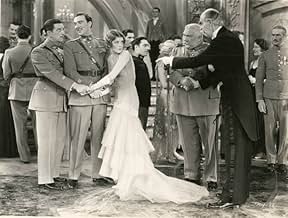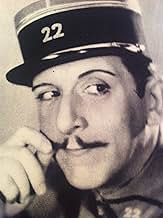A Legionnaire in love with an aspiring opera singer is expected to marry the general's daughter, who in turn is in love with another soldier.A Legionnaire in love with an aspiring opera singer is expected to marry the general's daughter, who in turn is in love with another soldier.A Legionnaire in love with an aspiring opera singer is expected to marry the general's daughter, who in turn is in love with another soldier.
Max Barwyn
- Bellini's Theatrical Manager
- (uncredited)
Lionel Belmore
- Cafe Manager
- (uncredited)
Gino Corrado
- Gino - Orchestra Leader in Cafe
- (uncredited)
George Davis
- Cafe Waiter
- (uncredited)
Eleanor Gutöhrlein
- Specialty Dancer
- (uncredited)
Karla Gutöhrlein
- Specialty Dancer
- (uncredited)
Armand Kaliz
- M. Bachegalupé
- (uncredited)
August Tollaire
- Milan Opera Fan
- (uncredited)
Ellinor Vanderveer
- Reception Guest
- (uncredited)
- Director
- Writers
- All cast & crew
- Production, box office & more at IMDbPro
Storyline
Did you know
- TriviaAlthough originally released in 2-strip Technicolor, the film only survives in black and white. The narrower surviving sound on film version is apparently the sole source of today's television prints, resulting in a loss of image on the left hand side which becomes all too apparent in the lop-sided musical numbers and cropped newspaper headline inserts.
- GoofsA poster advertises the opera Carmen by Bellini. Carmen is actually by Bizet.
- Quotes
Mme. Cecile: [Finding her employee, Fifi, smooching with Legionnaire Paul] Fifi! So this is the way you waste your time - canoodling!
Paul de St. Cyr: [Paul and Fifi get up, looking guilty] Don't blame Fifi, madame. It's my fault.
Mme. Cecile: Don't tell me what to do, you... you canoodler! Come, Fifi.
- ConnectionsVersion of Mademoiselle Modiste (1926)
- SoundtracksClothes Parade
(1905) (uncredited)
Music by Victor Herbert
Lyrics by Henry Martyn Blossom
Sung and danced by a chorus at Cecile's Modiste's shop
Featured review
I think my score of 3 might just be generous for this movie....as it's really, really bad. To make it worse, the film has some amazing actors in the film. However, the godawful musical numbers are so bad and so hard on your ears that even the best actors couldn't make this one work! Yes, the likes of Edward Everett Horton, Frank McHugh, Walter Pidgeon and Claude Gillingwater* couldn't make this one work!
The film is supposedly about French folks, but you'll never hear anything close to resembling a French accent in the film. It's a film about a Legionnaire (Pidgeon) falling for a cabaret singer...and the father (Gillingwater) refusing to allow the marriage. As for Bernice Claire, she plays the woman...and her acting isn't bad but when she began singing my dog attempted suicide several times! Yes, her operatic style and the songs were just awful and you need to hear them to believe them!! My daughter also heard a few songs and said something like "Why are you torturing yourself with this movie?!"....and that pretty much sums it up. It's a movie with nice acting and a decent plot...but the singing is just horrible. This film is one of the reasons why after a plethora of musicals in the late 20s and early 30s, Hollywood stopped making so many for a few years until they realized the public did enjoy musicals...provided they didn't stink!
*While very, very few people would know his name, Gillingwater made a career out of playing old sour pusses...and he was great at it! He really was amazing playing such parts and here he's at his best.
The film is supposedly about French folks, but you'll never hear anything close to resembling a French accent in the film. It's a film about a Legionnaire (Pidgeon) falling for a cabaret singer...and the father (Gillingwater) refusing to allow the marriage. As for Bernice Claire, she plays the woman...and her acting isn't bad but when she began singing my dog attempted suicide several times! Yes, her operatic style and the songs were just awful and you need to hear them to believe them!! My daughter also heard a few songs and said something like "Why are you torturing yourself with this movie?!"....and that pretty much sums it up. It's a movie with nice acting and a decent plot...but the singing is just horrible. This film is one of the reasons why after a plethora of musicals in the late 20s and early 30s, Hollywood stopped making so many for a few years until they realized the public did enjoy musicals...provided they didn't stink!
*While very, very few people would know his name, Gillingwater made a career out of playing old sour pusses...and he was great at it! He really was amazing playing such parts and here he's at his best.
- planktonrules
- May 11, 2022
- Permalink
Details
- Release date
- Country of origin
- Language
- Also known as
- Toast of the Legion
- Filming locations
- Production company
- See more company credits at IMDbPro
- Runtime1 hour 15 minutes
Contribute to this page
Suggest an edit or add missing content

























